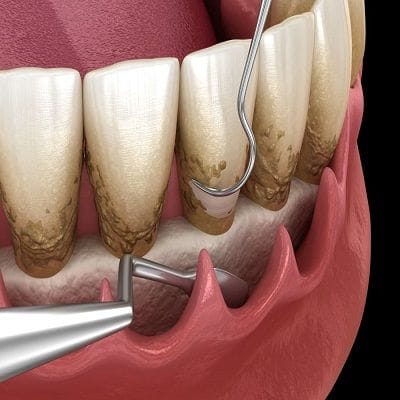
Our clinic provides all types of dental treatments, including treatment of periodontitis or Periodontal Disease. The causes of periodontal disease can be many factors, and the frequency of manifestation of this disease is slightly inferior to tooth decay. Moreover, the loss of teeth, in this case, is the highest.
The main provoking factor in developing periodontal disease and periodontitis is a plaque on the teeth and tartar, a breeding ground for pathogenic bacteria and viruses.
What Is Periodontal Disease?
Periodontal disease is an illness of the supporting structure of the tooth, and it is of a non-inflammatory nature. It is characterized by gradual progression, during which there is atrophy of the gums and exposure of the dental roots.
This dental problem, especially in the early stages, does not give any notable symptoms; therefore, it is often an accidental finding when examining the oral cavity. Periodontal disease is associated with metabolic disorders; therefore, older adults suffer from it more often.
What Are The Causes Of Periodontal Disease?
Despite the rapid development of medicine, it has not yet been possible to establish the exact causes of periodontal disease. Specialists highlight only the predisposing factors that have been identified in a large number of patients with this problem. These include:
- Hereditary reasons. Most patients diagnosed with periodontal disease have close relatives with the same problem.
- Endocrine pathology. Inadequate work of the endocrine glands provokes an imbalance of hormones in the body, which negatively affects the state of the tissues of the oral cavity, including
- Chronic diseases. This group of predisposing factors includes arterial hypertension, atherosclerosis and other vascular pathology.
- Elderly age.
What Are The Symptoms Of Periodontal Disease?
The clinical picture of the disease is poor; hence it is hard to find how fast does periodontal disease progress in Dubai, Abu Dhabi and Sharjah. The patient may pay attention to itching and bleeding of the gums, painful sensations in the teeth when eating food or drinks at high temperatures. In the future, with more significant exposure of the neck of the Tooth, pain syndrome appears. Unlike periodontitis, dystrophic changes in periodontal disease are very rarely accompanied by tooth mobility.
How Fast Does Periodontal Disease Progress?
In the clinical picture of periodontal disease, several stages are distinguished, each characterized by specific symptoms.
Initial:
The disease in the gums and bones at the initial stage is poorly expressed. Patients have:
- Itching or numbness in your gums
- Slight swelling
- Sensitivity in the area of the neck of the teeth, reaction to temperature and taste of food.
- The initial stage can last for several years and go unnoticed if the patient ignores the listed symptoms and does not visit the dentist.
- The development of the disease is accompanied by further exposure of the necks of the teeth without pus and gum pockets.
Average:
The following clinical signs characterize the periodontal disease of moderate severity:
- Development of bone tissue atrophy, exposure of roots up to 3 mm
- The spread of bone deficiency to half the length of the tooth root
- An intense reaction to the temperature and taste of food
- Bone sclerosis on x-rays
- Displacement of teeth, impaired diction.
Heavy:
At this stage of the disease, the bone tissue completely withers, the teeth are retained only by soft tissues. Strong mobility is observed. The roots are exposed by more than 5 mm. The mucous membrane of the gums may be reddened, but with atrophic periodontal disease, inflammation is not observed, a pale bluish tint prevails. Due to the change in the angle of inclination and increased mobility of the teeth, malocclusion occurs. Inflammatory processes can begin in the periodontal canals. The final sad result of the disease can be tooth loss.
An essential point in the diagnosis of Periodontal Disease in Dubai is its differentiation from periodontitis. The main methods of making a diagnosis:
- Finding out the patient’s medical history
- Examination of the oral cavity
- X-ray examination.
Depending on the results of the diagnostics, determining the stage of the disease, medications are prescribed, medical manipulations are carried out, and it can be determined How fast periodontal disease progresses in Dubai, Abu Dhabi and Sharjah.

































